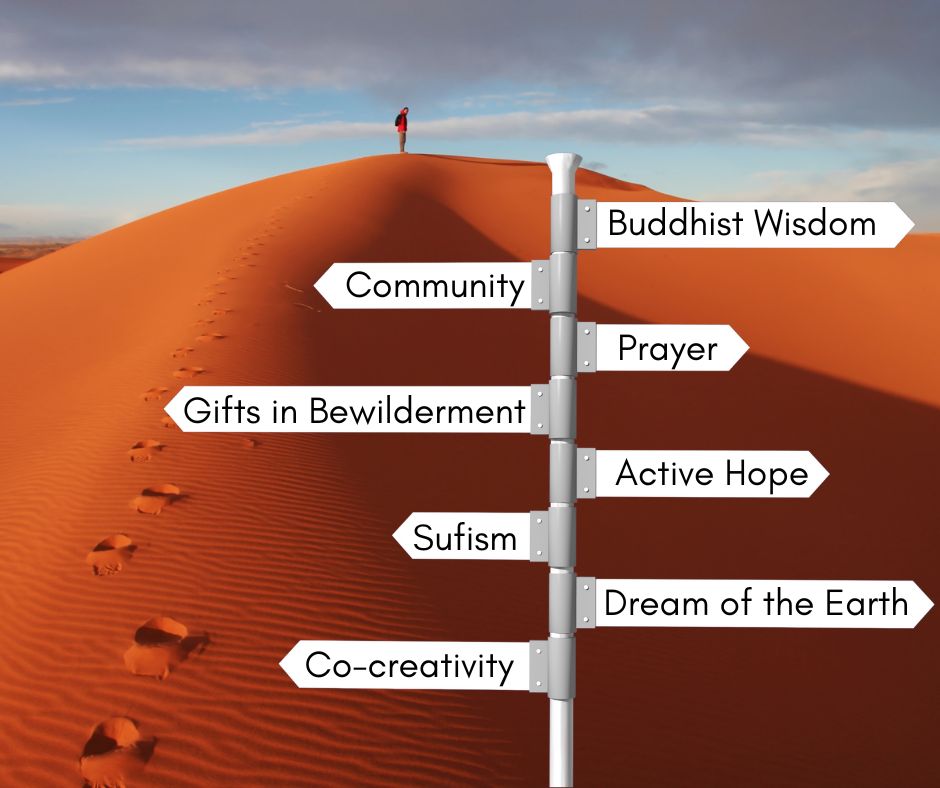I invite you to imagine that the bewildering, alarming events of recent years have positive aspects which we need to discern: why not try? Like me, you may have attempted to make sense of all this by rational means, and failed. Whilst specific crises may resolve, the ongoing level of disruption will probably keep growing. This blog offers some ideas on positive responses, finding the gifts in the storm.
The gifts in bewilderment
You may know Einstein’s saying, that a problem can be solved on the level on which it was created. Or Buckminster Fuller’s diction: “You never change things by fighting the existing reality… build a new model that makes the existing model obsolete.”
In their excellent book Active Hope, Joanna Macy and Chris Johnstone describe three stories that we use to make sense of the world:
- Business as Usual: things are basically fine, we just need a bit more economic growth and technology to deal with the problems.
- The Great Unravelling: we’re doomed, the ship’s going down.
- The Great Turning: if we have the courage to innovate radically, we can get through this crisis.
Right now, story 1 looks flakey, story 2 looks convincing, and story 3 deserves our serious consideration. So read on! The term polycrisis is a useful one to describe the multiple crises we are living through: the full implications are beyond imagining and bearing on the material level, but I believe that these crises need to be met on the spiritual and emotional levels too. Here are a few ways to see our crises differently, which have helped me and may serve you.
Co-creativity: how Natural Happiness can help
Organic gardeners and farmers face bewilderment on a daily basis, and without the power or control to impose an outcome. Co-creativity is my name for the main skill they use: the ability to dance with a problem, dialogue with it, and use stress to push their intuition into action. The Diamond Process, from my new book Natural Happiness, can help you do the same: see link here.
Sufi viewpoints: unlearning and more
Many Sufi practices aim at unlearning: freeing us from entrenched beliefs, so we can see reality more clearly. A crisis is a brilliant chance to unlearn! To explore this, see Neil Douglas-Klotz’s great book, The Sufi Book of Life. Sufis often use wazifas, sound mantras, to connect with divine qualities. To navigate bewilderment, I recommend using a four wazifa sequence which has helped me many times. Just click here.

The Dream of the Earth: Join in!
The pioneering eco-philosopher, Thomas Berry, saw Earth as a living organism. He writes, “we could describe our industrial society as the addictive, paralysing manifestation of a deep cultural pathology”. He coined the terms New Story and Dream of the Earth to urge us all to see ourselves as within Nature, and to start to dream and envision a positive change. He sees creation as a continuing story, in which we can each play a creative part. So if we’re all stuck at home with time on our hands, why not dream? For my blog on Thomas Berry, click here.
Embrace Buddhist Wisdom
Whilst I’m not an expert on Buddhism, I’ve drawn on its teachings for many years. Jem Bendell also recommends Buddhist practices as part of the Deep Adaptation response. I hope hard core Buddhists won’t mind me picking up a selection of of concepts for the current crisis:
Dukha and trishna: existence brings suffering, which arises from craving and attachment.
Maya: life is a series of illusions, we have to learn to see through them to find the truth, the essence.
Metta: loving-kindness, goodwill to others, compassion. A vital quality for our times. If you web-search metta meditation, you’ll find scripts and videos to guide you into metta.
Voluntary simplicity: Buddhist teachers urge us to choose a life of material simplicity, willingly turning away from the addictive seductions of consumer marketing. Right now, involuntary simplicity could be worth a try!
Pray — but be careful what you pray for
I was at an inspiring workshop with Gail Bradbrook, who said, “I find that prayer is answered if I pray for something more than my personal needs.” My main spiritual teacher for 20 years, Neil Douglas-Klotz, is best known for retranslating Jesus’ teachings from the original Aramaic. Here’s part of his rendering of Matthew 7:7:
Pray with desire — as though you interrogated your own soul about its deepest, most hidden longings;
And you will receive expansively — not only what your desire asked, but where the elemental breath led you —
Love’s doorstep, the place where you bear fruit and become part of the universe’s power of generation and sympathy.
This is surely a time for prayer, but what could we ask for? I’m praying that these crises serve the highest good for all life, and that suffering may be relieved wherever possible.
Find your community
In times of bewilderment and overwhelm: fellowship is crucial; for emotional support as much as practical, and for the witnessing and affirming that helps us feel that our reactions aren’t crazy, and we’re not alone: The Work that Reconnects process is a great way to do this, but you need a group! In recent years, I have been involved in various projects and workshops helping communities to raise their resilience and adapt to the climate crisis and related issues: you can see more about this at www.seedingourfuture.org.uk.
